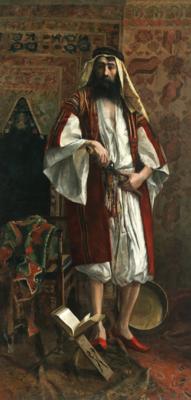Rudolf Ernst
(Vienna 1854–1932)
An Arab, signed R. Ernst, oil on canvas, 225 x 109 cm, framed
Provenance:
Private Collection, Damascus;
Private Collection, Germany.
A certificate issued by Prof. Dr. Helmut Börsch-Supan (copy), 6. august 2004, is available upon request.
Rudolf Ernst’s father, the successful Viennese architect Leopold Ernst, encouraged his son’s interest in the arts and supported him during his early training at the Vienna Academy. After winning a scholarship on his last year of schooling, he travelled through Italy, Morocco, Spain, and Tunis before settling down in Paris in 1876. Ernst continued to travel throughout the 1890’s, visiting Turkey and Egypt, where he bought a wide variety of artefacts and handicrafts which he would repeatedly use as props in his paintings. Moreover, he carried a camera with him, later using the photographs he took to recreate realistic compositions from his Paris atelier.
As a leading figure of the second generation of the Orientalist movement and under the influence of the omnipresent Jean-Léon Gérôme, Ernst showed a particular interest in painting scenes which reflected daily life as imagined in the West. Furthermore, Ernst adopted the great master's naturally accurate, detailed renderings and use of bright colours.
It has long been speculated that the present lot is a portrait of Abd el Kadir (1808-1883), Algerian leader, scholar, and Arab folk hero. Despite certain elements which could point towards a positive identification of the sitter, such as the sword representing military accomplishments, the choice of bright, immaculate white for the man’s burnous (a distinctive element of his dress), or the slight resemblance of his face to other contemporary renditions; it is more likely to be a variation of the sentinel theme.
Several elements in the painting can be accurately identified and belonged to the collection of props owned by Ernst, such as the Qur'an stand, or the Anatolian carpets in the background – a bird Ushak and a Ghiordes. Ernst was known to be less concerned with ethnographic accuracy and combined information and objects from different sources to create studio assemblages, which provided the desired “exotic” compositions which would dazzle the Western eye.
The present lot is a tour de force within the oeuvre of the artist and a culmination of Ernst’s artistic production. Unique not only for its unusually large size, but for the display of an extraordinary mastery of plasticity, as well as great dexterity at delicately rendering different textures and surfaces. There is no doubt that this superb painting is a prime example of Ernst’s exquisite craftsmanship and evocative talent.
02.05.2023 - 18:00
- Estimate:
-
EUR 80,000.- to EUR 120,000.-
Rudolf Ernst
(Vienna 1854–1932)
An Arab, signed R. Ernst, oil on canvas, 225 x 109 cm, framed
Provenance:
Private Collection, Damascus;
Private Collection, Germany.
A certificate issued by Prof. Dr. Helmut Börsch-Supan (copy), 6. august 2004, is available upon request.
Rudolf Ernst’s father, the successful Viennese architect Leopold Ernst, encouraged his son’s interest in the arts and supported him during his early training at the Vienna Academy. After winning a scholarship on his last year of schooling, he travelled through Italy, Morocco, Spain, and Tunis before settling down in Paris in 1876. Ernst continued to travel throughout the 1890’s, visiting Turkey and Egypt, where he bought a wide variety of artefacts and handicrafts which he would repeatedly use as props in his paintings. Moreover, he carried a camera with him, later using the photographs he took to recreate realistic compositions from his Paris atelier.
As a leading figure of the second generation of the Orientalist movement and under the influence of the omnipresent Jean-Léon Gérôme, Ernst showed a particular interest in painting scenes which reflected daily life as imagined in the West. Furthermore, Ernst adopted the great master's naturally accurate, detailed renderings and use of bright colours.
It has long been speculated that the present lot is a portrait of Abd el Kadir (1808-1883), Algerian leader, scholar, and Arab folk hero. Despite certain elements which could point towards a positive identification of the sitter, such as the sword representing military accomplishments, the choice of bright, immaculate white for the man’s burnous (a distinctive element of his dress), or the slight resemblance of his face to other contemporary renditions; it is more likely to be a variation of the sentinel theme.
Several elements in the painting can be accurately identified and belonged to the collection of props owned by Ernst, such as the Qur'an stand, or the Anatolian carpets in the background – a bird Ushak and a Ghiordes. Ernst was known to be less concerned with ethnographic accuracy and combined information and objects from different sources to create studio assemblages, which provided the desired “exotic” compositions which would dazzle the Western eye.
The present lot is a tour de force within the oeuvre of the artist and a culmination of Ernst’s artistic production. Unique not only for its unusually large size, but for the display of an extraordinary mastery of plasticity, as well as great dexterity at delicately rendering different textures and surfaces. There is no doubt that this superb painting is a prime example of Ernst’s exquisite craftsmanship and evocative talent.
|
Buyers hotline
Mon.-Fri.: 10.00am - 5.00pm
kundendienst@dorotheum.at +43 1 515 60 200 |
| Auction: | 19th Century Paintings |
| Auction type: | Saleroom auction with Live Bidding |
| Date: | 02.05.2023 - 18:00 |
| Location: | Vienna | Palais Dorotheum |
| Exhibition: | 22.04. - 02.05.2023 |
More objects by this artist
-

Estimate:
EUR 20,000.- to EUR 30,000.-

